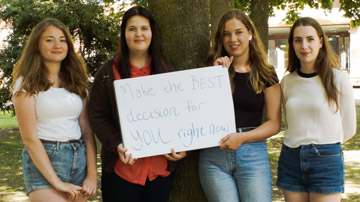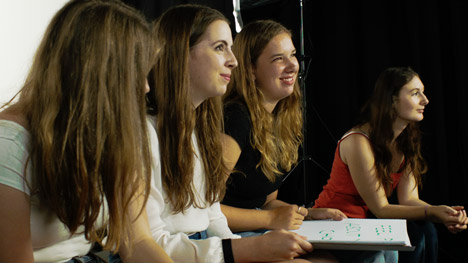
Making a Free Choice Making a free choice means feeling that the decisions you make about drinking, and when you drink, are really your own.
Making a free choice means feeling proud about making drinking choices which reflect your personality, values and priorities.
It’s important to make your own choices about whether or not to drink – and, if you choose to drink, whether you drink in a way that allows you to stay in your Sweet Spot by enjoying the moment, staying physically healthy, feeling like yourself, staying safe and secure, and feeling like you belong.
Young people said that making your own choices about drinking can be an important part of getting older. Some said that when alcohol first became available to them, this seemed like an exciting shift – and then the novelty often wore off and the excitement faded. Many young people said that making a free choice meant thinking about what was important to them, their families and their communities. They mentioned beliefs that people who don’t drink are not able to think for themselves or are rigid in their thinking, but told us that these are often just stereotypes. They had made their own choices, for themselves.
“There’s no in-between I felt like if I want to enjoy myself, I’d have to get wasted, otherwise there’s no point.”
“Me and my friends literally have no idea what happened, ‘cos all of us obviously went out with the intention to stay sober, and the opposite happened.”
 Getting carried away in the moment and drinking more than you’d hoped to can mean feeling like you didn’t really make a free choice. Young people said they sometimes got carried away by the physical effects of alcohol, beliefs that they’d feel even better by drinking more, or encouragement to join in with drinking. This can be part of the experience of drinking for some young people, but choosing to give up control over yourself by drinking too much may mean that you later feel regret over that choice.
Getting carried away in the moment and drinking more than you’d hoped to can mean feeling like you didn’t really make a free choice. Young people said they sometimes got carried away by the physical effects of alcohol, beliefs that they’d feel even better by drinking more, or encouragement to join in with drinking. This can be part of the experience of drinking for some young people, but choosing to give up control over yourself by drinking too much may mean that you later feel regret over that choice.
Even though some people feel they need to personally experience excess in order to genuinely make a free choice, many others feel that they don’t need to push beyond their personal boundaries in order to know enough to make their own decisions.
There may be expectations among friends focusing on spending time in pubs, invitations to join in rounds or play drinking games and ideas that a “good night out” involves excessive drinking. Expectations like these can mean that you get caught up and end up drinking more than you’d prefer.
Remember that you’re not making a lifetime decision – you change the amount you drink, or your choice to drink at all, at any time. You’re making the best decision for you, right now.
Think about the “done thing” among your friends – are there hidden rules and expectations about drinking? Showing respect for other people’s decisions about drinking can help others realise that you have thought about your choices and they are important to you. But it can help to look honestly at how you and your friends tend to drink when you get together.

Feel proud about your choices. There may be small difficulties sometimes, but they’re worth it.